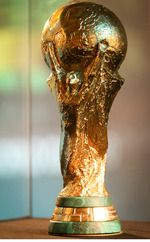This is the second time that Germany and Argentina have met in the World Cup Finals. In 1986, their first match ended with Argentina winning 3 – 2 against then West Germany. Four years later, West Germany took home the cup with a 1 – 0 win. Today is anyone’s guess, both are strong teams but Germany seems to be the more aggressive and dominated the ball in most of their games. Yet, many are optimistic about an Argentina victory.
World Cup final: Argentina won’t buckle like Brazil, says Pablo Zabaleta
by Owen Gibson, The Guardian
• Full-back says side is too strong to suffer same fate as hosts
• Confidence untouched as team prepares to face GermanyArgentina will learn the lessons of Brazil’s World Cup humiliation and maintain the steely focus that has taken them to the brink of a historic victory in their neighbour’s backyard, according to Pablo Zabaleta.
As Alejandro Sabella’s agent revealed to an Argentinian radio station that he planned to step down after the World Cup final, Zabaleta vowed to ensure their coach went out on a high against Germany .
The Manchester City full-back echoed the surprise of the rest of the footballing world at Brazil’s “strange” capitulation in Belo Horizonte but said his robust and resolute Argentina side would not make the same mistake if they lost an early goal.
“Even if you concede some goals before 15 minutes or 20 minutes you need to keep calm and keep playing in the same way as we have been doing for these six games,” said Zabaleta, whose tears of relief and battered, bruised face after their semi-final victory over Holland seemed to sum up their scrappy, resolute run to the final.
“A football game is just about 90 minutes. If you concede some goals and you try to score as soon as possible, you concede space at the back and you are finished. It was a lesson for us, the Brazil game.”
Joachim Löw can steer Germany to World Cup glory against Argentina
by Zico, The Guardian
The way Germany crushed Brazil makes them favourites in the final but don’t count out some Lionel Messi magic
So here we are: Germany and Argentina, two traditional football nations, will decide the 2014 World Cup and no one can say they don’t deserve to be within one game of the trophy.
While demonstrating different profiles and styles, both negotiated passage through one of the most competitive tournaments in history and we are in for a very special game at the Maracanã. I have the feeling it will be more like chess than the festival of sprints we have seen throughout this World Cup but it should still be memorable.
Just don’t expect a goal festival like Germany v Brazil. In fact, the drubbing delivered to the hosts by Thomas Müller and co was one of the main reasons the second semi-final was such an anticlimax in comparison. Argentina and Holland both entered the game with a risk-averse plan and played pretty tight. Argentina knew they needed to sort out their defence after multiple scares in the group stages but they finally did with the arrival of Martín Demichelis who, alongside Ezequiel Garay, formed a very reliable centre-back pair.
On the Dutch side Louis van Gaal adopted the same strategy and that helped bring about a stalemate. Neither team gave the other space and, while Holland managed to keep Lionel Messi quiet, the Argentinians neutralised Arjen Robben.
Besides the controversy over the costs, construction of the stadiums and ticket scalping scandals, FIFA is also taking criticism over their lack of concern for player safety. UNlke the NFL, FIFA has disregarded the dangers of repeated concussions and returning to play soon after a head injury. They and the fans are far more concerned over the players practice of “diving,” pretending to be injured to draw a foul, as explained in this article from The New York Times.
Shouting About Diving, but Shrugging About Concussions
World Cup 2014: Injuries to Mascherano and Neymar Demonstrate Poor Medical Care
When Argentina midfielder Javier Mascherano cracked heads with a Dutch player during a World Cup semifinal last week, millions of soccer fans saw it. [..]
Spectators didn’t need a medical degree to realize that he had hurt his head, and probably his brain, and that someone with a medical degree should properly evaluate him.
But then came yet another example of the dysfunction of FIFA, the sport’s world governing body, and how it is apparently indifferent to player safety, given what it has shown at this World Cup: Mascherano spent about two minutes on the sideline before returning for the rest of the match. That’s about four or five minutes before he should have returned, if he had received a proper neurological evaluation to determine the extent of his injury. [..]
Mascherano’s injury came about a week after the Brazilian star Neymar took a knee to the back in a quarterfinal match and fell to the ground, writhing in pain and saying he couldn’t feel his legs. Medical workers went to him without a backboard and instead rolled him onto a stretcher. Then they jogged off the field with him jostling around and crying out with every step. One person even slapped his right leg several times.
Once again, no medical degree was needed to see that it wasn’t the best treatment of someone who might have just sustained a serious spinal injury. Neymar, as it turned out, had a fractured vertebra.
It’s a wonder what medical protocols FIFA enforces – if it enforces any at all – when the world is not watching. But it’s a good bet that the federation would have snapped to attention if any of those players had faked an injury.
It’s obvious that FIFA needs to catch up with 21st century medical protocols.
Meanwhile, in Italy, there was some speculation on any friendly rivalry between Pope Francis, an Argentinian, and Pope Benedict XVI, a German, since their home country teams are rivals:
The Vatican spokesman, the Rev. Federico Lombardi, who has fielded soccer questions this week with a chuckling amusement, doubted the two men would watch the game together, or at all. He noted that Benedict, a scholarly theologian and author of a multipart meditation on the life of Jesus, has never been much of a soccer fan, “though he clearly understands that it’s important to many people.” (In March 2012, Benedict did greet the German star Miroslav Klose at the Vatican.)
The first Latin American pope, Francis is unquestionably a fan, who as archbishop of Buenos Aires cheered for San Lorenzo, a local soccer club. After San Lorenzo won the Argentine championship last year, a small delegation of managers and players came to the Vatican in December to present Francis with a trophy and an inscribed team jersey that read, “Francisco Campeon,” or “Francis Champion.” [..]
And will the pope be watching on Sunday night?
Father Lombardi said the pope “sent the Argentine team his best wishes before the tournament,” but added that Francis watches very little television, “and especially at that hour.”
“Above all,” he added, “I think they both want the best team to win. They’re above partisan passion. In this, they are united.”
There is still time to get yourself some snacks and drinks to get you through to the end of the match. One of the drinks concocted to commemorate the games is the German 71, in honor of the score of the Brazil – German match:
The German 71
1 ounce Monkey 47 gin
1/2 ounce fresh lemon juice
1/2 ounce simple syrup
2 ounces Dr. L Sparkling Riesling
Lemon twist
1. Fill a cocktail shaker with ice, gin, lemon juice and syrup.
2. Pour into flute or cocktail glass, chilled if you like. Top with sparkling wine. Add lemon twist.
Note: To make simple syrup, combine 1 teaspoon of sugar for each ounce of water. Microwave until hot. Stir until sugar is dissolved. Let cool before mixing drink.
The article suggest not pouring a new drink with every goal if the Germans are on their game again today. Like the team. the drink is more potent than it looks. I do doubt many Brazilians will be toasting the winner with that.
One last note, today is the anniversary of the first World Cup in 1930. The first venue was in Uruguay and the first two matches were played simultaneously on July 13. Those games were won by France and USA, who defeated Mexico 4-1 and Belgium 3-0 respectively. The first World Cup was won by the host country, Uruguay who defeated Argentina 4-2 in Montevideo before a crowd of 93,000.
I have no favorite, although this would be Germany’s first cup since the unification and they have shown themselves to be quite formidable. So, may the best team win.



Recent Comments